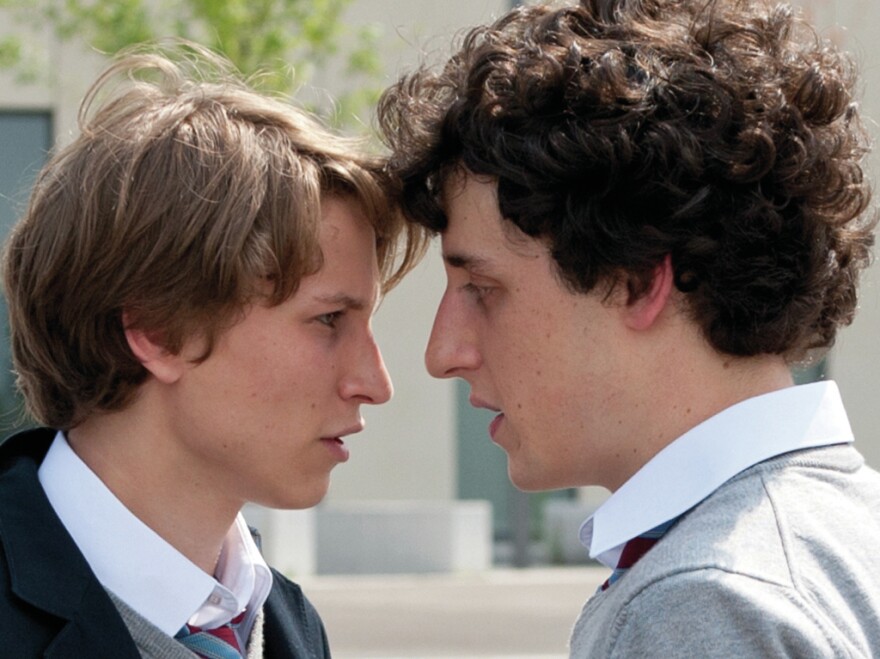Among the semi-literate journals submitted by his high-school students, jaded French literature teacher Germain (Fabrice Luchini) is jazzed to find a rough diamond from a new pupil, Claude (Ernst Umhauer).
In weekly installments, the ingratiating but enigmatic teenager, who looks as though he just stepped out of a Pasolini movie, chronicles his efforts to insinuate himself into the family of one his classmates, an amiable but awkward underachiever named Rapha (Bastien Ughetto).
Recognizing a potential talent, Germain, a failed novelist and champion of the classics, begins to nurture the boy's efforts while reading his escapades aloud to his increasingly fascinated wife, Jeanne, who runs the kind of art gallery that exhibits Hitler figures with breasts. (She's played by Kristin Scott Thomas, spraying wry asides in spotless French.) From a literary standpoint, the couple doesn't seem well-matched. Also, they lack passion.
Claude's motives for horning in on the Raphas' lives — he has a roaring crush on the voluptuous mother, Esther, nicely played by Emmanuelle Seigner, also known as Roman Polanski's wife — turn out to be more murky than even this calculating youngster knows. Inevitably, his sojourn among the Raphas (ostensibly as a math tutor) alters the course of their relatively untroubled existence.
It also rebounds on him and on his mentor, who's old enough to know better — and plenty ripe for the galloping mid-life crisis that will place his own domestic arrangements in jeopardy. Writer and mentor become part of the story; bourgeois contentment goes out the window.
If you wanted to be an aesthetic realist about it — and writer-director Francois Ozon wants you to, on and off — you could stop at pop psychology, and In the House, which is adapted from a Spanish stage play, would still be a perfectly decent night out. Is it the oft-told tale of a motherless boy crushing on an older woman and leeching off the stable family he never had? Certainly.

Could it also be the story of a childless middle-aged man trying to plug the holes in his life by vicariously writing the great novel he couldn't pull off himself? Definitely. Is there a thread about the infinite human capacity for self-deception and betrayal covering for the desperate need to find a safe berth in life? Sure.
In the House is often mordantly funny. Luchini is France's master of deadpan comedy: When he does farce, it carries an undertow of sorrow, and vice versa. Scott Thomas, too often unimaginatively cast as sour or depressed viragos, holds her own beautifully as the vinegary, ambitious Jeanne. Through her, Ozon has some fun with contemporary art; he also pokes entertainingly at the puffed-up rhetoric of France's current educational-reform conversation. Germain may roll his eyes at his principal's rapturous endorsement of school uniforms as the way forward, but he remains passionate about literature; any teacher would understand his pouncing on promise, though they might balk at the lengths he will go to to promote it.
So everyone in this movie is plausible. But are they real, or figments of a budding writer's hungry imagination, fed by an enabler with his own unacknowledged desires? A blizzard of multiple perspectives and tonal shifts is set off by Philippe Rombi's lovely score, by turns exuberant, ferocious and wistful.
Ozon keeps sliding between genres ("Now we are in bad farce," scolds the teacher) to explore what really interests him — the creative process itself. He's forever knocking us off the naturalist's perch, and it's not just the plot that keeps getting re-engineered. The movie keeps asking us to reconsider who's the audience for this endlessly revised tableau. Is it us, or the writing partners, or the spouses — or all of the above?
Most important, at least for Ozon: Who's the author? In the House posits the artist as a kind of predator, at once monstrously detached and hopelessly overinvolved, preying on his material and ruining his subjects' lives for the sake of a good yarn. I can't decide whether that's wise or merely clever.
At the end, Germain and Claude sit side by side, competitively lathering up tales about the people they see through the windows of an apartment building across the park. There's a sense in which both bedraggled men have lost everything, and an even more powerful sense that telling stories — making art, if you want to get fancy — doesn't just mean the world to them. It is their world. (Recommended)
Copyright 2021 NPR. To see more, visit https://www.npr.org.


